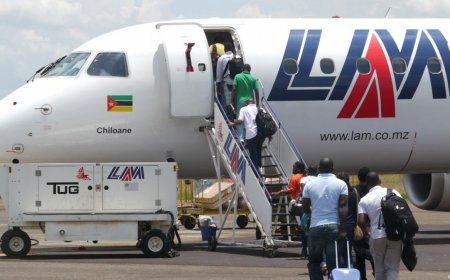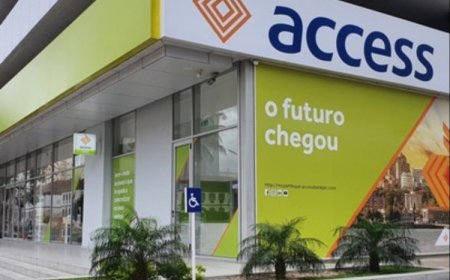Mozambique's banking sector under Portuguese control
Commercial banks operating within Mozambique's financial system are under the control of a group of Portuguese individuals, presumably friends among themselves. This group manages the six largest banks with systemic importance in the national economy. With Mozambique on the Financial Action Task Force (FATF) grey list, questions arise about the impact of this group on the performance of the country's financial system.
Recent complaints from current and former employees of national banks point to practices of racial discrimination and mistreatment, favoring individuals with lighter skin over national and black citizens.
According to the Secretary-General of the National Union of Bank Employees (SNEB), this situation is concerning, and the organization has received several complaints from workers. However, the SNEB recommends that these complaints be directed to the General Labor Inspectorate (IGT).
National Banks Led by Portuguese
The leadership of Mozambique's commercial banks is often occupied by Portuguese nationals. A former employee of Standard Bank told TORRE.News that these managers often bring in their friends for prominent positions, even without the necessary technical skills.
Standard Bank in Mozambique is headed by Bernardo Aparício, a Portuguese national appointed in 2021 as Managing Director (MD), replacing Nigerian Adimohanma Chukwuma Nwokocha.
Before this position, Aparício was at ABSA Bank Mozambique, where he was reportedly involved in a mega fraud case, alongside other allegations of mismanagement and transferring friends to Standard Bank, an issue still under investigation by TORRE.News.
Banco Comercial de Investimento (BCI), a subsidiary of Banco Comercial Português (BCP) and one of the largest commercial banks in Mozambique, is managed by Francisco Costa, also Portuguese, who holds the position of President of the Executive Committee (PCE).
Costa faces accusations of extramarital relations with bank employees who are promoted without the proper qualifications, according to an anonymous complaint sent to TORRE.News.
Nedbank Mozambique (formerly Banco Único) is led by Joel Rodrigues, who assumed the position of Chairman of the Executive Board in 2022. Before him, the bank was managed by António Correia, another Portuguese, appointed PCE in March 2015.
Millennium bim has Rui Nelson Moreira de Carvalho Maximino as Interim President of the Executive Committee, also Portuguese.
ABSA Bank Mozambique is managed by Pedro Carvalho since 2022, succeeding Rui Barros, both Portuguese, with Barros holding the position since 2014.
Moza Banco is led by Manuel Soares, another Portuguese who occupies the PCE position.
This list of the six commercial banks with systemic importance in Mozambique raises questions about the increasing trend of appointing foreigners to top management positions with significant decision-making power.
TORRE.News has learned from reliable sources that some of these banks, such as Standard Bank and Millennium bim, have created bonus packages and annual bonuses much higher for Portuguese employees and managers, while Mozambicans receive low packages without any explanation of the criteria used.
This situation, at least at Millennium bim, is being arbitrated by the Resident Inspector sent by the Bank of Mozambique.
Interestingly, some of these Portuguese managers are accused of using tourist visas to leave their home countries and, once in Mozambique, assuming prominent positions, violating the type of visa they possess and the nature of their legal entry into the country.
Banks Use Political Figures as “Lobbyists”
While the top management of banks with decision-making power is assumed by Portuguese, these same banks place Mozambicans, preferably influential political figures, as Chairpersons of the Board of Directors (PCA). These positions, in practice, do not have the power to make significant decisions.
The Portuguese, mostly Managing Directors (MDs) or Presidents of the Executive Committee (PCEs), hold the power to make the main decisions at these commercial banking institutions.
Evidence of this is found in email correspondences showing that the PCA of Standard Bank, for instance, agreed to pay compensation to a former employee claiming moral damages caused by the company and work time.
However, despite the PCA's agreement, the payment did not occur because the bank's MD, Bernardo Aparício, a Portuguese national, did not consider the PCA's decision relevant
At this same bank, Esselina Macome was appointed Chair of the Board of Directors (PCA). BCI appointed Carlos Agostinho do Rosário, former Prime Minister of Mozambique, as PCA.
ABSA Bank Mozambique appointed Luísa Diogo, a political figure who also served as Prime Minister of Mozambique until the end of her term in 2010, as Chair of the Board of Directors.
On this phenomenon, the Governor of the Bank of Mozambique, Rogério Zandamela, stated in 2017 that banks bring in Mozambican politicians as PCAs but, in reality, they are lobbyists using their influence to drive business.
The Problem Lies in Weak Supervision
From a legal standpoint, lawyer Victor da Fonseca explained to TORRE.News that this situation constitutes a violation of human rights, specifically regarding the right to work, a situation he understands to be close to neocolonialist exploitation.
“We, at this moment and as Mozambicans, are being financially enslaved by yesterday's colonizer, and this is all allowed by our government,” Fonseca stated. He adds that the problem begins when the government cannot supervise labor norms, allowing foreigners to enter the country and start working in commercial banking without proper oversight.
Fonseca believes that from a technical skills perspective, there are more qualified Mozambicans than some Portuguese who, benefiting from friendly relations, assume prestigious positions. This preferential choice for Portuguese over black Mozambicans violates the principle of equality and universality stipulated in Article 35 of the Constitution of the Republic of Mozambique.
Paradoxically, while Portuguese nationals establish themselves in Mozambique, Mozambicans seeking work opportunities in Portugal, even with higher education, are often subjected to precarious jobs and deplorable living conditions.
This may be occurring because, according to a video made by a Portuguese national circulating on social media, the Portuguese are dissatisfied with the influx of Mozambicans to their lands and ask them to return to their countries of origin.
"Go back to your countries, go back to your families, to your women, and invest in your countries, because Portugal is for the Portuguese," said a Portuguese national in a video posted on social media.
Colonialism Still Present in Mozambique
From a social perspective, Portuguese sociologist Boaventura de Sousa Santos understands that the issue of Portuguese colonialism in Mozambique is a phenomenon that still persists and whose impacts are felt today, despite the fact that Mozambicans are in political power.
He observes that current figures in power tend to consult the former Portuguese colonizer on government decisions. To understand this process of persistent colonialism in Mozambique, the sociologist cites Mozambican rapper Azagaia.
“To understand this phenomenon, one must seek Azagaia, one must listen to 'Cães de Raça' by Azagaia. From there, you understand that what ended in Mozambique is historical colonialism,” Boaventura de Sousa Santos emphasizes. He adds that internally, there is still much colonial-type exploitation within Mozambique, as also happens in Angola.
Currently, the preference for Portuguese in banking management in Mozambique goes unnoticed by both the government and the regulator of commercial banks, the Bank of Mozambique.
However, it is consensual that the presence of Portuguese in top positions, which grants them better living conditions to the detriment of nationals, is questioned and censured both within the corridors of banks and at the level of society in general.





















